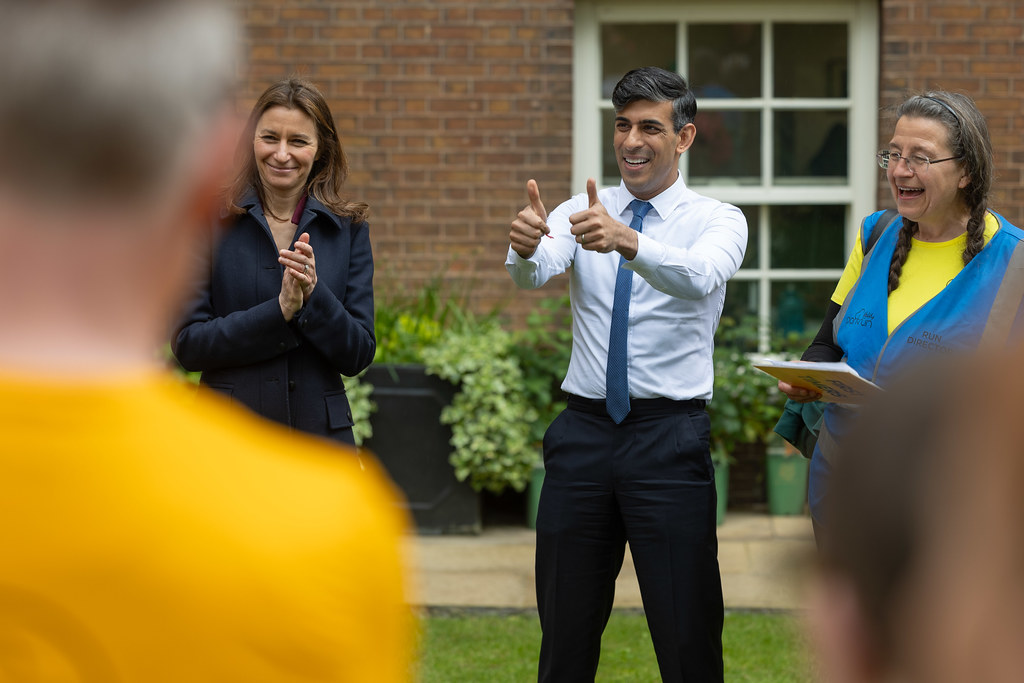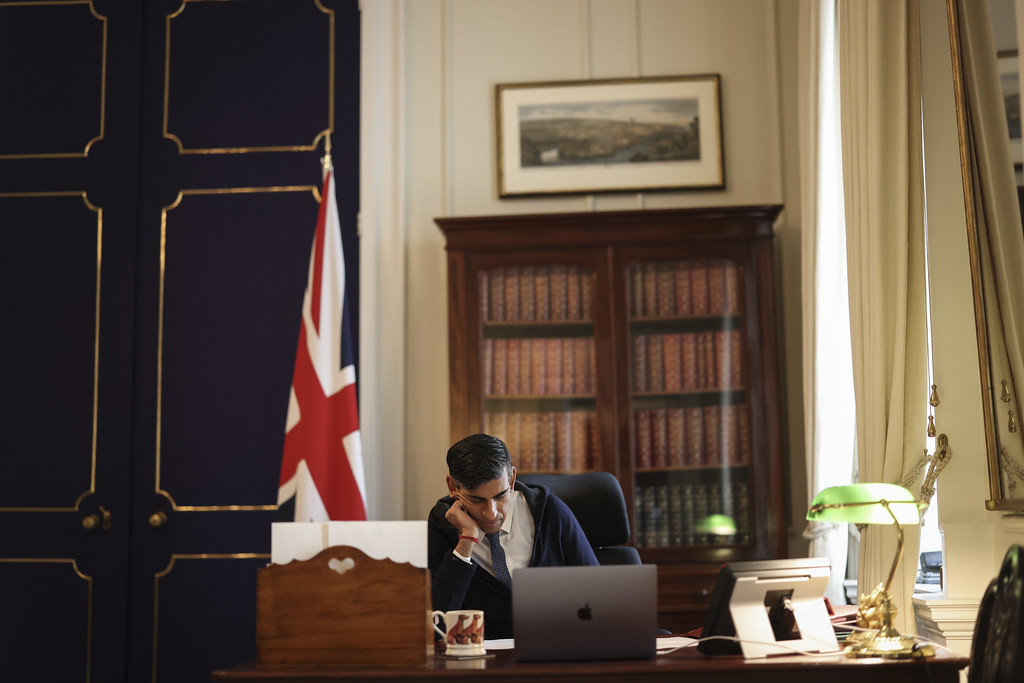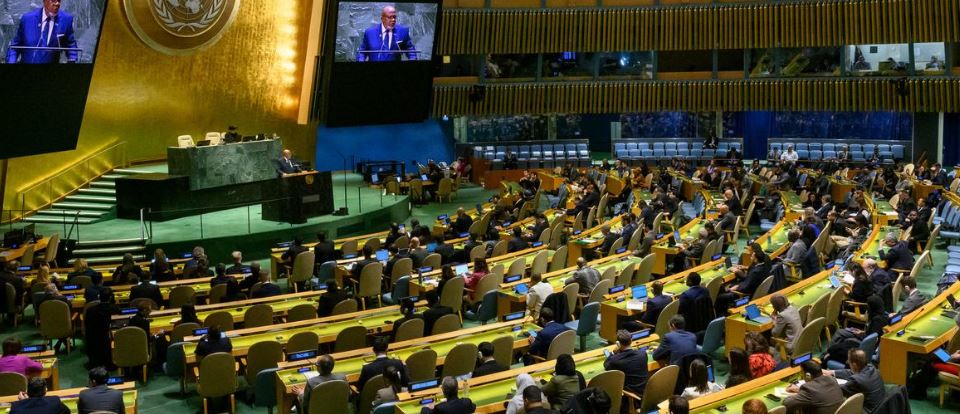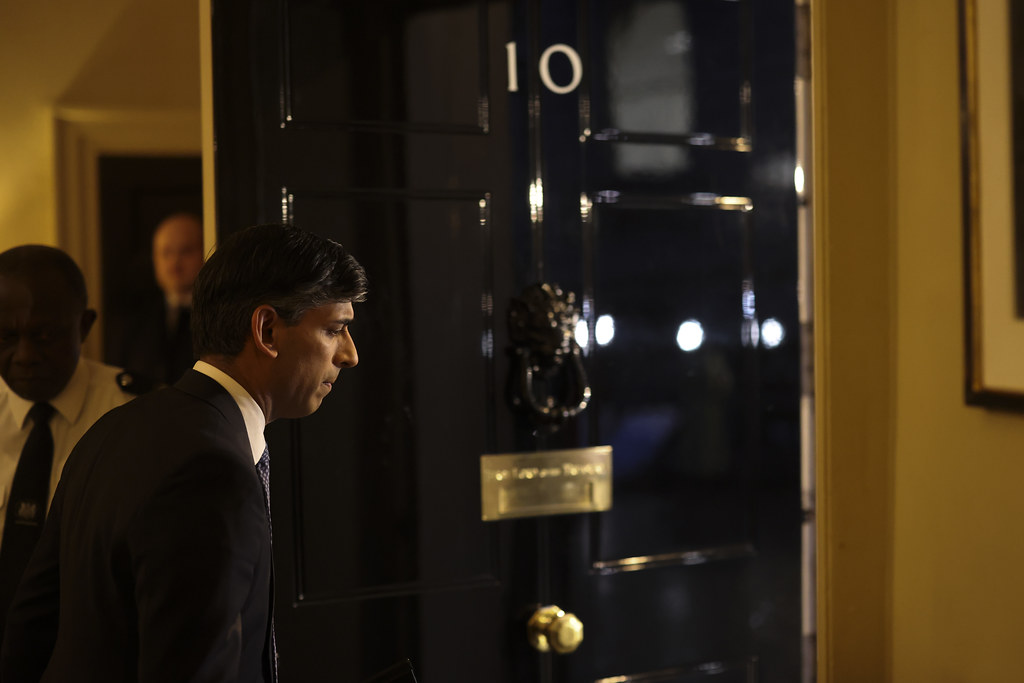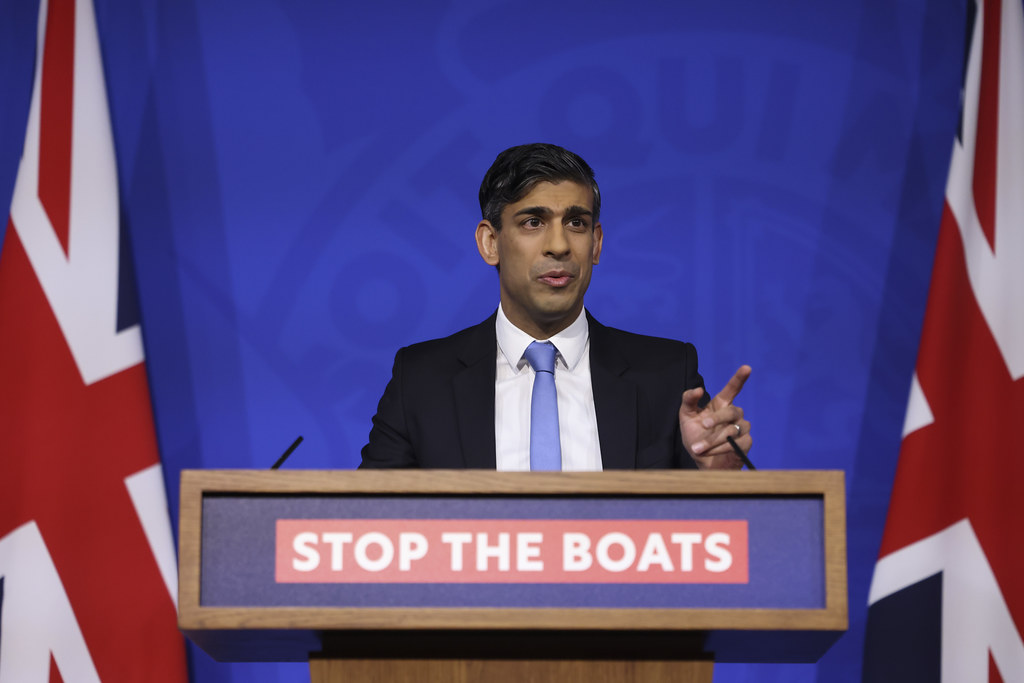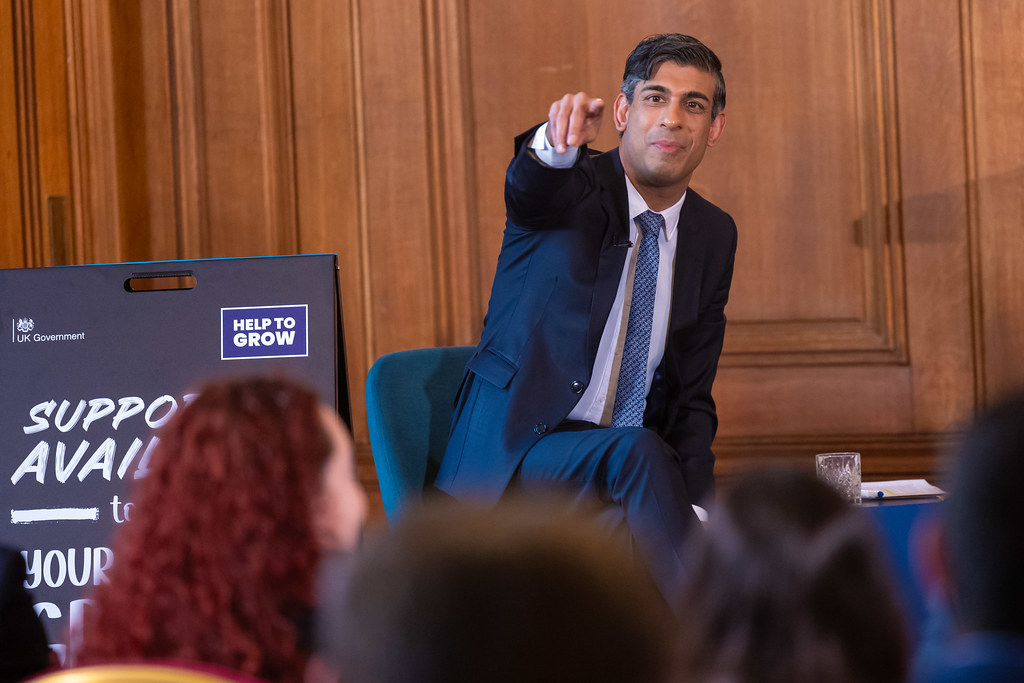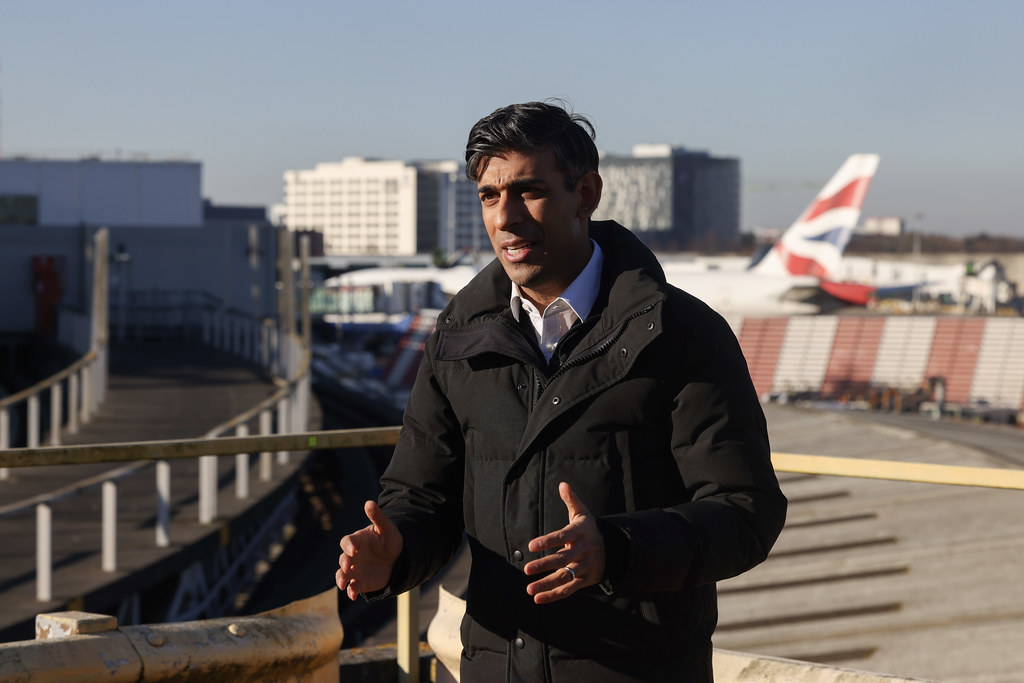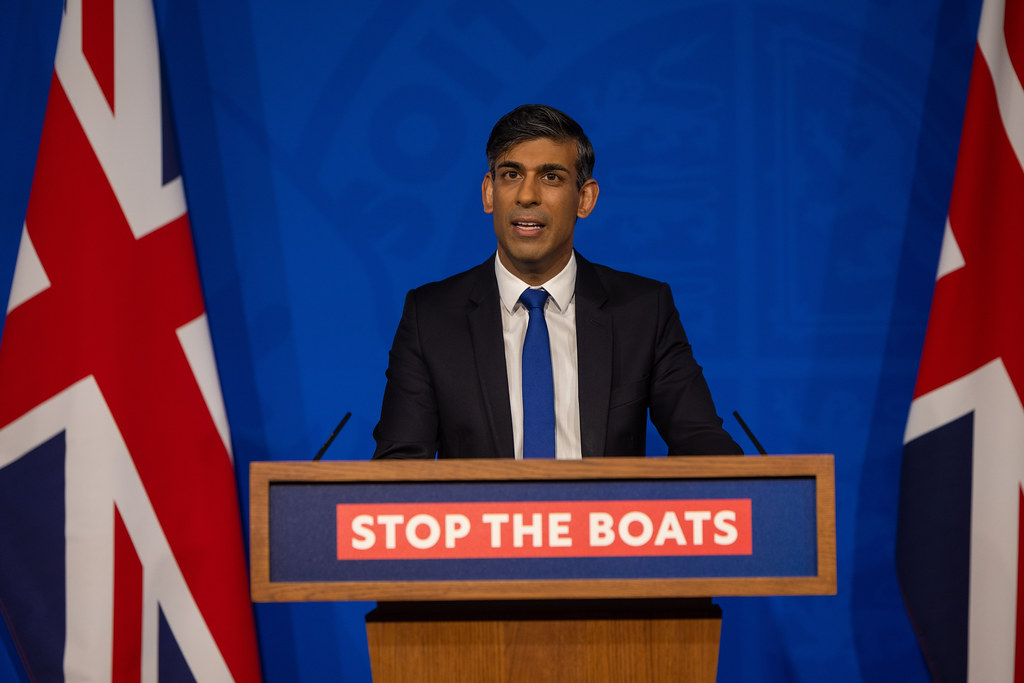PM rows back on a £1,000 bet with Morgan on whether deportation flights to Rwanda would take off before the general election, saying he was “not a betting person”…reports Asian Lite News
Prime Minister Rishi Sunak has been criticised by opposition parties for a bet over his Rwanda policy. Asked by TalkTV’s Piers Morgan if he would bet £1,000 for a refugee charity that deportation flights would take off before the next election, the PM shook hands with him. Labour said it showed he was “totally out of touch with working people”.
The SNP said it had reported Sunak for a potential breach of ministerial rules over the “grotesque” bet.
The party’s Cabinet Office spokeswoman, Kirsty Blackman, has written to the PM’s independent adviser on ministers’ interests, Sir Laurie Magnus, and Cabinet Secretary Simon Case, calling for an investigation into whether Sunak broke the Ministerial Code.
In her letter, she pointed to rules that state ministers should ensure no conflict appears to arise between their public duties and private interests, and that they should not accept any gift which could appear to compromise their judgement or place them under an improper obligation.
Blackman said: “Placing a bet on the lives of vulnerable refugees fleeing war and persecution is grotesque, callous and downright cruel – and shows just how out of touch Westminster is with the values of people in Scotland.
“It’s particularly shameful that Rishi Sunak, one of the richest men in the UK, thinks it’s appropriate to accept a £1,000 wager – and will remind ordinary working families that near billionaire Sunak doesn’t have a clue what life is like for the rest of us in a cost of living crisis.”
Labour’s shadow paymaster general Jonathan Ashworth said: “Not a lot of people facing rising mortgages, bills and food prices are casually dropping £1,000 bets.”
Liberal Democrat home affairs spokesperson Alistair Carmichael said: “Instead of placing a trashy bet on the Rwanda scheme, the prime minister should put his money where his mouth is on the soaring NHS backlog.”
The policy of sending some asylum seekers to Rwanda aims to deter people from crossing the Channel and is a key part of Sunak’s pledge to “stop the boats”. However, the plan has been stalled by legal challenges, with no deportation flights taking off yet.
In an attempt to revive the policy, the government introduced legislation declaring Rwanda a safe country but the bill needs to be approved by the House of Lords, where it has faced significant opposition, before it becomes law.
The government has said it is still aiming for flights to take off by the spring. In an interview on TalkTV, Morgan challenged the PM: “I’ll bet you £1,000 to a refugee charity you don’t get anybody on those planes before the election.”
Shaking hands with the presenter, Sunak said: “I want to get people on the planes.” Sunak has said he expects a general election to be held in the second half of this year and one must legally take place by the end of January 2025.
Pressed over whether he had accepted the bet, the prime minister’s official spokesman said: “What is coming through in that interview is the prime minister’s absolute confidence that we will get flights off the ground.”
Asked whether, with the government taking a hard line on gambling, this set a good example, he said: “He’s focused on doing what is needed to deliver on the priorities for the British people.”
Meanwhile, Sunak has rowed back on a £1,000 bet with the broadcaster Piers Morgan on whether deportation flights to Rwanda would take off before the general election, saying he was “not a betting person”.
The prime minister said on Tuesday he had been “taken by surprise” when Morgan said to him during a TalkTV interview: “I’ll bet you £1,000 to a refugee charity [that] you don’t get anybody on those planes before the election. Will you take that bet?”
Asked if he understood the financial pressures facing ordinary households, given he had made a £1,000 bet on a whim, Sunak said: “When it comes to cost of living, when I first got this job I set out five priorities – the first of them was to halve inflation because I absolutely understood that the cost of living was the most pressing problem most families faced.”
Asked if it shocked him that poor families were reportedly having to water down baby formula, the prime minister replied: “Of course I am sad to hear that people are in that situation.”
He said it was difficult to comment on individual cases that were put to him and he committed to sitting down with the people involved if he was written to.
PM rows back on a £1,000 bet with Morgan on whether deportation flights to Rwanda would take off before the general election, saying he was “not a betting person”…reports Asian Lite News
Prime Minister Rishi Sunak has been criticised by opposition parties for a bet over his Rwanda policy. Asked by TalkTV’s Piers Morgan if he would bet £1,000 for a refugee charity that deportation flights would take off before the next election, the PM shook hands with him. Labour said it showed he was “totally out of touch with working people”.
The SNP said it had reported Sunak for a potential breach of ministerial rules over the “grotesque” bet.
The party’s Cabinet Office spokeswoman, Kirsty Blackman, has written to the PM’s independent adviser on ministers’ interests, Sir Laurie Magnus, and Cabinet Secretary Simon Case, calling for an investigation into whether Sunak broke the Ministerial Code.
In her letter, she pointed to rules that state ministers should ensure no conflict appears to arise between their public duties and private interests, and that they should not accept any gift which could appear to compromise their judgement or place them under an improper obligation.
Blackman said: “Placing a bet on the lives of vulnerable refugees fleeing war and persecution is grotesque, callous and downright cruel – and shows just how out of touch Westminster is with the values of people in Scotland.
“It’s particularly shameful that Rishi Sunak, one of the richest men in the UK, thinks it’s appropriate to accept a £1,000 wager – and will remind ordinary working families that near billionaire Sunak doesn’t have a clue what life is like for the rest of us in a cost of living crisis.”
Labour’s shadow paymaster general Jonathan Ashworth said: “Not a lot of people facing rising mortgages, bills and food prices are casually dropping £1,000 bets.”
Liberal Democrat home affairs spokesperson Alistair Carmichael said: “Instead of placing a trashy bet on the Rwanda scheme, the prime minister should put his money where his mouth is on the soaring NHS backlog.”
The policy of sending some asylum seekers to Rwanda aims to deter people from crossing the Channel and is a key part of Sunak’s pledge to “stop the boats”. However, the plan has been stalled by legal challenges, with no deportation flights taking off yet.
In an attempt to revive the policy, the government introduced legislation declaring Rwanda a safe country but the bill needs to be approved by the House of Lords, where it has faced significant opposition, before it becomes law.
The government has said it is still aiming for flights to take off by the spring. In an interview on TalkTV, Morgan challenged the PM: “I’ll bet you £1,000 to a refugee charity you don’t get anybody on those planes before the election.”
Shaking hands with the presenter, Sunak said: “I want to get people on the planes.” Sunak has said he expects a general election to be held in the second half of this year and one must legally take place by the end of January 2025.
Pressed over whether he had accepted the bet, the prime minister’s official spokesman said: “What is coming through in that interview is the prime minister’s absolute confidence that we will get flights off the ground.”
Asked whether, with the government taking a hard line on gambling, this set a good example, he said: “He’s focused on doing what is needed to deliver on the priorities for the British people.”
Meanwhile, Sunak has rowed back on a £1,000 bet with the broadcaster Piers Morgan on whether deportation flights to Rwanda would take off before the general election, saying he was “not a betting person”.
The prime minister said on Tuesday he had been “taken by surprise” when Morgan said to him during a TalkTV interview: “I’ll bet you £1,000 to a refugee charity [that] you don’t get anybody on those planes before the election. Will you take that bet?”
Asked if he understood the financial pressures facing ordinary households, given he had made a £1,000 bet on a whim, Sunak said: “When it comes to cost of living, when I first got this job I set out five priorities – the first of them was to halve inflation because I absolutely understood that the cost of living was the most pressing problem most families faced.”
Asked if it shocked him that poor families were reportedly having to water down baby formula, the prime minister replied: “Of course I am sad to hear that people are in that situation.”
He said it was difficult to comment on individual cases that were put to him and he committed to sitting down with the people involved if he was written to.
ALSO READ-Sunak suffers defeat in vote to delay Rwanda asylum treaty


